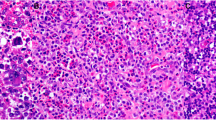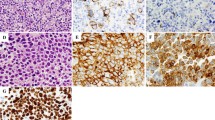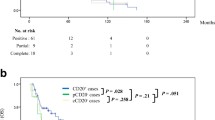Abstract
Brentuximab vedotin (BV), CD30 specific antibody drug conjugate, has been used to treat anaplastic large cell lymphoma (ALCL) and classic Hodgkin lymphoma (CHL); it is also used in the treatment of other CD30-positive peripheral T-cell lymphomas. We aimed to investigate the incidence and clinicopathological characteristics of patients with ALCL or CHL with loss of or decrease in CD30 expression after BV-containing therapy. Twelve and nine patients with refractory/relapsed CHL and ALCL, respectively, were analyzed after receiving BV-containing therapy. In four ALCL patients (44%), CD30 expression was lost/decreased in re-biopsy materials, including one with complete loss and three with a reduction of less than 20%. All 12 CHL patients showed consistent CD30 expression levels after BV treatment. Compared with five ALCL patients with consistent CD30 expression, four ALCL patients with a loss of/decrease in CD30 expression received a higher cumulative dose of BV (P = 0.014) and revealed a lower intensity of CD30 expression in initial biopsy materials (P = 0.017). The subtypes of ALCL (ALK positive, ALK negative, and primary cutaneous) were not related to the loss of/decrease in CD30 expression. In conclusion, 44% of ALCL patients, regardless of histological subtypes, showed a loss of/decrease in CD30 expression after receiving BV-containing therapy, but this phenomenon was not observed in CHL patients. A higher cumulative dose of BV and a lower amount of CD30 antigen in tumor cells in the initial biopsy materials might be predictors of a loss of/decrease in CD30 expression in ALCL patients.

Similar content being viewed by others
Data Availability
The datasets generated and/or analyzed during the current study are available from the corresponding author upon reasonable request.
References
van der Weyden CA, Pileri SA, Feldman AL, Whisstock J, Prince HM (2017) Understanding CD30 biology and therapeutic targeting: a historical perspective providing insight into future directions. Blood Cancer J. https://doi.org/10.1038/bcj.2017.85
Okeley NM, Miyamoto JB, Zhang X, Sanderson RJ, Benjamin DR, Sievers EL, Senter PD, Alley SC (2010) Intracellular activation of SGN-35, a potent anti-CD30 antibody-drug conjugate. Clin Cancer Res 16:888–897. https://doi.org/10.1158/1078-0432.CCR-09-2069
Goyal A, Patel S, Goyal K, Morgan EA, Foreman RK (2019) Variable loss of CD30 expression by immunohistochemistry in recurrent cutaneous CD30+ lymphoid neoplasms treated with brentuximab vedotin. J Cutan Pathol 46:823–829. https://doi.org/10.1111/cup.13545
Al-Rohil RN, Torres-Cabala CA, Patel A, Tetzlaff MT, Ivan D, Nagarajan P, Curry JL, Miranda RN, Duvic M, Prieto VG, Aung PP (2016) Loss of CD30 expression after treatment with brentuximab vedotin in a patient with anaplastic large cell lymphoma: a novel finding. J Cutan Pathol 43:1161–1166. https://doi.org/10.1111/cup.12797
Arai H, Furuichi S, Nakamura Y, Nakamura Y, Ichikawa M, Mitani K (2016) ALK-negative anaplastic large cell lymphoma with loss of CD30 expression during treatment with brentuximab vedotin. Rinsho Ketsueki 57:634–637. Japanese. https://doi.org/10.11406/rinketsu.57.634
WHO Classification of Tumours Editorial Board (2022) Hematolymphoid tumors [Internet; beta version ahead of print (in progress)]. Lyon (France): International Agency for Research on Cancer. (WHO classification of tumors series, 5th ed.). https://tumourclassification.iarc.who.int. Accessed 18 June 2023
Feldman AL, Oishi N, Ketterling RP, Ansell SM, Shi M, Dasari S (2022) Immunohistochemical approach to genetic subtyping of anaplastic large cell lymphoma. Am J Surg Pathol 46:1490–1499. https://doi.org/10.1097/PAS.0000000000001941
Parrilla Castellar ER, Jaffe ES, Said JW, Swerdlow SH, Ketterling RP, Knudson RA, Sidhu JS, Hsi ED, Karikehalli S, Jiang L, Vasmatzis G, Gibson SE, Ondrejka S, Nicolae A, Grogg KL, Allmer C, Ristow KM, Wilson WH, Macon WR, Law ME, Cerhan JR, Habermann TM, Ansell SM, Dogan A, Maurer MJ, Feldman AL (2014) ALK-negative anaplastic large cell lymphoma is a genetically heterogeneous disease with widely disparate clinical outcomes. Blood 124:1473–1480. https://doi.org/10.1182/blood-2014-04-571091
Horwitz S, O’Connor OA, Pro B, Trümper L, Iyer S, Advani R, Bartlett NL, Christensen JH, Morschhauser F, Domingo-Domenech E, Rossi G, Kim WS, Feldman T, Menne T, Belada D, Illés Á, Tobinai K, Tsukasaki K, Yeh SP, Shustov A, Hüttmann A, Savage KJ, Yuen S, Zinzani PL, Miao H, Bunn V, Fenton K, Fanale M, Puhlmann M, Illidge T (2022) The ECHELON-2 Trial: 5-year results of a randomized, phase III study of brentuximab vedotin with chemotherapy for CD30-positive peripheral T-cell lymphoma. Ann Oncol 33:288–298. https://doi.org/10.1016/j.annonc.2021.12.002
Maeshima AM, Taniguchi H, Fujino T, Saito Y, Ito Y, Hatta S, Yuda S, Makita S, Fukuhara S, Munakata W, Suzuki T, Maruyama D, Izutsu K (2020) Immunohistochemical CD20-negative change in B-cell non-Hodgkin lymphomas after rituximab-containing therapy. Ann Hematol 99:2141–2148. https://doi.org/10.1007/s00277-019-03853-1
Miyoshi H, Arakawa F, Sato K, Kimura Y, Kiyasu J, Takeuchi M, Yoshida M, Ichikawa A, Ishibashi Y, Nakamura Y, Nakashima S, Niino D, Sugita Y, Ohshima K (2012) Comparison of CD20 expression in B-cell lymphoma between newly diagnosed, untreated cases and those after rituximab treatment. Cancer Sci 103:1567–1573. https://doi.org/10.1111/j.1349-7006.2012.02307.x
Hiraga J, Tomita A, Sugimoto T, Shimada K, Ito M, Nakamura S, Kiyoi H, Kinoshita T, Naoe T (2009) Down-regulation of CD20 expression in B-cell lymphoma cells after treatment with rituximab-containing combination chemotherapies: its prevalence and clinical significance. Blood 113:4885–4893. https://doi.org/10.1182/blood-2008-08-175208
Sugimoto T, TomitaA HJ, Shimada K, Kiyoi H, Kinoshita T, Naoe T (2009) Escape mechanisms from antibody therapy to lymphoma cells: downregulation of CD20 mRNA by recruitment of the HDAC complex and not by DNA methylation. Biochem Biophys Res Commun 390:48–53. https://doi.org/10.1016/j.bbrc.2009.09.059
Chen R, Hou J, Newman E, Kim Y, Donohue C, Liu X, Thomas SH, Forman SJ, Kane SE (2015) CD30 downregulation, MMAE resistance, and MDR1 upregulation are all associated with resistance to brentuximab vedotin. Mol Cancer Ther 14:1376–1384. https://doi.org/10.1158/1535-7163.MCT-15-0036
Maeshima AM, Taniguchi H, Fukuhara S, Norikawa N, Munakata W, Maruyama D, Kim SW, Watanabe T, Kobayashi Y, Tobina K, Tsuda H (2013) Follow-up data of 10 patients with B-cell non-Hodgkin lymphoma with a CD20-negative phenotypic change after rituximab-containing therapy. Am J Surg Pathol 37:563–570. https://doi.org/10.1097/PAS.0b013e3182759008
Makita S, Maeshima AM, Taniguchi H, Kitahara H, Fukuhara S, Munakata W, Suzuki T, Maruyama D, Kobayashi Y, Tobinai K (2016) Classical Hodgkin lymphoma primary refractory to brentuximab vedotin, with transformation to CD30-positive diffuse large B-cell lymphoma. Int J Hematol 104:396–399. https://doi.org/10.1007/s12185-016-2018-y
Marques-Piubelli ML, Kim DH, Medeiros LJ, Lu W, Khan K, Gomez-Bolanos LI, Rodriguez S, Parra ER, Ok CY, Aradhya A, Solis LM, Nieto YL, Steiner R, Ahmed S, Vega F (2023) CD30 expression is frequently decreased in relapsed classic Hodgkin lymphoma after anti-CD30 CAR T-cell therapy. Histopathology 83:143–148. https://doi.org/10.1111/his.14910
Funding
This study was partly supported by the Japan Agency for Medical Research and Development Fund [grant number 23ck0106670h0003].
Author information
Authors and Affiliations
Contributions
YK and AMM: conceptualization, methodology, investigation, formal analysis, and writing – original draft preparation. YT and HT: Formal analysis. TO, HM, SM, NI, SF, WM, CO, and KI: Investigation. All authors: confirmation of the final version of this manuscript.
Corresponding author
Ethics declarations
The study was approved by the institutional review board of the National Cancer Center (2017–342) and was conducted following the Declaration of Helsinki.
Conflict of interest
There is no conflict of interest to declare.
Additional information
Publisher’s Note
Springer Nature remains neutral with regard to jurisdictional claims in published maps and institutional affiliations.
Rights and permissions
Springer Nature or its licensor (e.g. a society or other partner) holds exclusive rights to this article under a publishing agreement with the author(s) or other rightsholder(s); author self-archiving of the accepted manuscript version of this article is solely governed by the terms of such publishing agreement and applicable law.
About this article
Cite this article
Kaimi, Y., Takahashi, Y., Taniguchi, H. et al. Loss of or decrease in CD30 expression in four patients with anaplastic large cell lymphoma after brentuximab vedotin-containing therapy. Virchows Arch 484, 465–473 (2024). https://doi.org/10.1007/s00428-024-03764-1
Received:
Revised:
Accepted:
Published:
Issue Date:
DOI: https://doi.org/10.1007/s00428-024-03764-1




